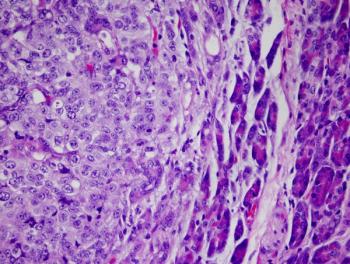
Data from the EMBARK trial show no significant differences in sexual activity and urinary symptoms when suspending treatment with enzalutamide.

Your AI-Trained Oncology Knowledge Connection!


Data from the EMBARK trial show no significant differences in sexual activity and urinary symptoms when suspending treatment with enzalutamide.

Adverse effects associated with oral azacitidine in low- or intermediate-risk MDS are typically transient, according to Mikkael A. Sekeres, MD, MS.

Secondary end points such as overall survival also appear to favor T-DXd among this breast cancer population in the phase 3 DESTINY-Breast06 trial.

Data also show a longer median time to deterioration for patients in the inavolisib arm in phase 3 INAVO120 trial.

Phase 2 data also show activity in diseases with resistance mutations such as G2032R with taletrectinib.

The safety profile of oral azacitadine was shown to be similar across the 200-mg and 300-mg arms in patients with lower- to intermediate-risk MDS.

Attending educational sessions may help with understanding how to manage toxicities associated with enfortumab vedotin in rare genitourinary cancers.

There was no benefit derived from adding atezolizumab to chemotherapy and bevacizumab in patients with recurrent ovarian cancer.

A survival benefit was observed when nivolumab and ipilimumab were combined to treat ovarian or gynecologic clear cell carcinoma.

A trend towards improved progression-free survival was not noted when pembrolizumab plus sacituzumab govitecan was used to treat patients with HR+ breast cancer.

Either telehealth or in-person recipes of palliative care did not impact the quality of life outcomes for patients with advanced non–small cell lung cancer.

The combination of perioperative chemotherapy plus FLOT improved overall survival vs neoadjuvant chemoradiation in patients with resectable esophageal cancer.

Osimertinib may become a new standard of care for those with EGFR-mutant NSCLC, according to Suresh S. Ramalingam, MD, FACP, FASCO.

Data from the ADRIATIC trial show consistent PFS and OS benefits with durvalumab across predefined limited-stage small cell lung cancer subgroups.

Phase 3 findings show the benefit of immunotherapy before surgery in those with macroscopic stage III node-positive melanoma.

The CARACO study shows that adding retroperitoneal lymphadenectomy to cytoreductive surgery did not improve survival in advanced ovarian cancer.

Triplet therapies containing belantamab mafodotin may fulfill an unmet need for patients with multiple myeloma following the first relapse.

Increased PFS was noted with abemaciclib plus fulvestrant vs fulvestrant alone in hormone receptor–positive, HER2-negative advanced breast cancer after disease progression on a CDK4/6 inhibitor and endocrine therapy.

CHAARTED2 trial showed an improved progression-free survival in patients with metastatic castration-resistant prostate cancer treated with cabazitaxel, abiraterone acetate, and prednisone.

The addition of tucidinostat to R-CHOP demonstrated promising safety and efficacy outcomes in patients with previously untreated diffuse large B-cell lymphoma) expressing MYC and BCL-2, according to interim analysis results.

Relapse-free survival was improved when anthracycline combo was used to treat MammaPrint high-2–risk, BluePrint Luminal B, HR-positive, HER2-negative breast cancer.

A PFS benefit with adagrasib was observed across all key patient subgroups in the phase 3 KRYSTAL-12 trial.

Ongoing genomic profiling analyses in the ASC4FIRST trial may further determine which patients with CML may benefit from treatment with asciminib.

Adjuvant sacituzumab govitecan demonstrated a complete response, but its future in bladder cancer is uncertain after a recent protocol amendment.

Treatment with DFF332 appears to be safe and tolerable across all dose levels, according to Sumanta Kumar Pal, MD.

Neoadjuvant avelumab plus cisplatin yielded high event-free survival in muscle-invasive urothelial carcinoma.

Subcutaneous amivantamab proved noninferior vs intravenous administration in EGFR-mutated non–small cell lung cancer.

Subgroup findings suggest a PFS benefit with the addition of encorafenib/binimetinib in patients with liver metastases.

Updated MARIPOSA results found improves progression-free survival in patients with high-risk EGFR-mutant advanced non-small cell lung cancer when treated with amivantimab/lazertinib.

Brentuximab vedotin led to unprecedented progression-free survival for patients with classical Hodgkin lymphoma.